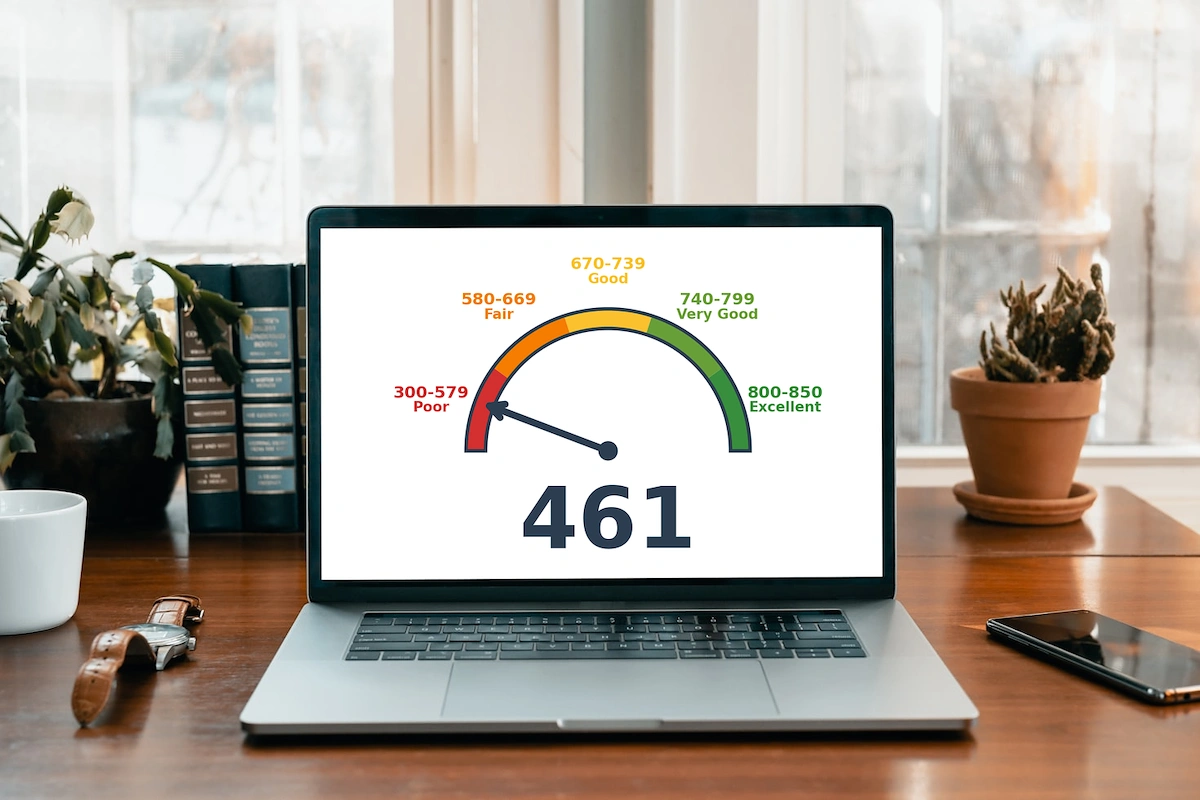
Kudos has partnered with CardRatings and Red Ventures for our coverage of credit card products. Kudos, CardRatings, and Red Ventures may receive a commission from card issuers. Kudos may receive commission from card issuers. Some of the card offers that appear on Kudos are from advertisers and may impact how and where card products appear on the site. Kudos tries to include as many card companies and offers as we are aware of, including offers from issuers that don't pay us, but we may not cover all card companies or all available card offers. You don't have to use our links, but we're grateful when you do!
461 Credit score: What You Need to Know in 2026
July 1, 2025


TL;DR
A 461 credit score presents a significant opportunity for improvement and is a starting point for building a stronger financial profile. This score falls into the "Poor" range on the FICO scale, which can create challenges when seeking new lines of credit.
What Does a 461 Credit Score Mean?
A 461 credit score falls into the "poor" range of the FICO scoring model, which spans from 300 to 850. For lenders, this number signals a high-risk borrower, reflecting a history of significant financial difficulties. This can severely limit your financial options, making it tough to get approved for new credit cards or loans. Any credit you do secure will likely come with steep interest rates and unfavorable terms, making borrowing a costly endeavor.
While a score this low presents immediate obstacles, it isn't a life sentence. Think of it as a baseline from which you can build. It highlights a clear need to address your financial habits and begin the process of rebuilding your credit history. Though the journey requires patience and discipline, improving your financial standing is entirely possible over time.
Who Has a 461 Credit Score?
While age isn't a direct factor in credit score calculations, data shows a strong correlation between age and higher scores. Older consumers generally have more time to build a positive payment history and a longer credit history. According to a 2023 generational breakdown from Experian, average FICO scores steadily increase with age:
- Generation Z (ages 18-26): 680
- Millennials (ages 27-42): 690
- Generation X (ages 43-58): 709
- Baby Boomers (ages 59-77): 745
- Silent Generation (ages 78+): 760
Credit Cards With a 461 Credit Score
A credit score of 461 falls into the "very poor" range, which can make qualifying for a traditional credit card a significant challenge. Most major lenders view a score this low as a strong indicator of high risk, leading to likely denials for unsecured cards with favorable terms. Consequently, your options will probably be restricted to secured credit cards that require a cash deposit or certain unsecured cards specifically designed for rebuilding credit, which often come with high fees and interest rates.
Kudos offers AI-powered tools like Dream Wallet that analyze your financial situation to provide personalized card recommendations and insights into how a new card might impact your credit score. By matching your profile against its large database, Kudos helps you find suitable options designed to fit your needs and help you build credit responsibly.
Auto Loans and a 461 Credit Score
A 461 credit score places you in the deep subprime category, which lenders view as high-risk. While you may still get approved for an auto loan, you will likely face significantly higher interest rates and less favorable terms.
According to 2025 data on average auto loan rates, here is how interest breaks down by credit score bracket:
- Super-prime (781-850): 5.25% for new cars and 7.13% for used cars
- Prime (661-780): 6.87% for new cars and 9.36% for used cars
- Non-prime (601-660): 9.83% for new cars and 13.92% for used cars
- Subprime (501-600): 13.18% for new cars and 18.86% for used cars
- Deep subprime (300-500): 15.77% for new cars and 21.55% for used cars
Mortgages at a 461 Credit Score
A 461 credit score makes qualifying for a mortgage extremely challenging. Most mainstream lenders, including those offering government-backed loans, have higher minimums; FHA loans, for example, require a score of at least 500. With a score this low, your options are generally limited to rare specialty or subprime lenders, according to current mortgage requirements.
If you do find a lender, a 461 score will lead to unfavorable terms. Expect to face significantly higher interest rates, larger down payment requirements, and extra fees. Your application will also likely undergo a stricter review process known as manual underwriting, where lenders scrutinize every detail of your financial history.
What's in a Credit Score?
Figuring out what goes into your credit score can feel like trying to solve a complex puzzle, but it's primarily based on a handful of key financial habits. The most common factors include:
- Your payment history tracks whether you have paid past credit accounts on time.
- Credit utilization is the percentage of your available credit that you are currently using.
- The length of your credit history considers the age of your oldest account and the average age of all your accounts.
- Having a healthy mix of credit types, such as credit cards and installment loans, can positively impact your score.
- Recent credit inquiries and newly opened accounts can temporarily lower your score.
How to Improve Your 461 Credit Score
Don't be discouraged by a 461 credit score; improving your creditworthiness is entirely possible with consistent, positive financial habits. There are several proven methods you can use to start rebuilding your credit profile today.
- Monitor your credit reports regularly. Checking your reports allows you to spot and dispute inaccuracies that could be unfairly dragging down your score. For someone with a score in the 400s, correcting even a single error can have a meaningful impact.
- Establish automatic bill payments. Your payment history is the most significant factor in your score, and a 461 score likely reflects missed payments. Setting up automatic payments is a critical step to ensure you build a positive history of paying on time.
- Apply for a secured credit card. A low score makes it difficult to get approved for new credit, but a secured card is designed for this situation. It helps you build a fresh history of responsible use that gets reported to the credit bureaus.
- Reduce your credit utilization ratio. If you have existing balances, paying them down shows lenders you can manage debt responsibly. Keeping your balances low, ideally under 30% of your limit, is a key strategy for improving a poor credit score.
For help managing your cards and tracking your progress, consider using a financial tool like Kudos to stay on top of your credit-building journey.
Unlock your extra benefits when you become a Kudos member

Turn your online shopping into even more rewards

Join over 400,000 members simplifying their finances

Editorial Disclosure: Opinions expressed here are those of Kudos alone, not those of any bank, credit card issuer, hotel, airline, or other entity. This content has not been reviewed, approved or otherwise endorsed by any of the entities included within the post.



































.webp)







